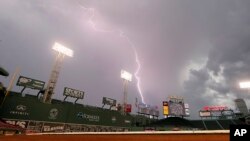Rising global temperatures may cause a big jolt in the number of lightning strikes in the United States over the rest of the 21st century in the latest example of extreme weather spawned by climate change, scientists say.
Researchers forecast on Thursday that lightning strikes will increase by about 50 percent by 2100 in the continental United States because thunderstorms will become more explosive in the coming decades thanks to a warming planet.
This increase could lead to more wildfires, because lightning already triggers half of these blazes in the United States, the researchers said. Lightning also kills dozens of Americans annually, with that risk expected to rise.
Considering factors including precipitation levels, cloud buoyancy and warming air, the scientists predicted a 7 percent increase in the number of lightning strikes with each degree Fahrenheit of global average temperature increase (12 percent for each degree Celsius).
The 11 different climate models used in the study pointed to an increase of 7 degrees Fahrenheit (4 degrees Celsius) between now and 2100.
"There are about 30 million strikes per year in the contiguous U.S. now. So, in 2100, we would expect about 45 million per year," said climate scientist David Romps of the University of California-Berkeley and the U.S. government's Lawrence Berkeley National Laboratory, who led the study published in the journal Science.
"For every two lightning strikes in 2000, there will be three lightning strikes in 2100," Romps added.
The researchers said rising temperatures breed lightning because the amount of water vapor in the atmosphere — the fuel for thunderstorms — increases exponentially as the air gets warmer.
"As the planet warms, there will be more of this fuel lying around, so when thunderstorms get triggered, they will be more energetic. This increase in thunderstorm energy is the primary reason for the projected increase in lightning strikes," Romps said.
Many experts blame weather intensity in recent years on global climate change they attribute to human activities.
"The body of research attributing trends in extreme weather to human influence is certainly growing rapidly," said University of California-Berkeley climate researcher Jacob Seeley.
"We are pushing our climate system into uncharted territory, and that means we're going to see phenomena that are extreme compared to what humans have experienced thus far during the relatively short amount of time we have been flourishing on this planet," Seeley added.





